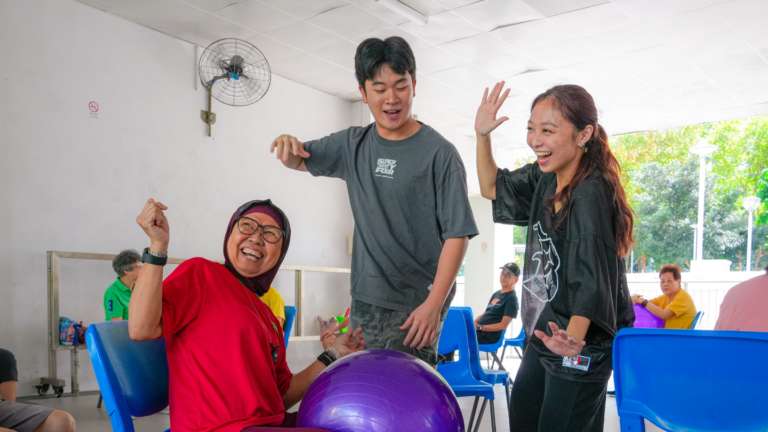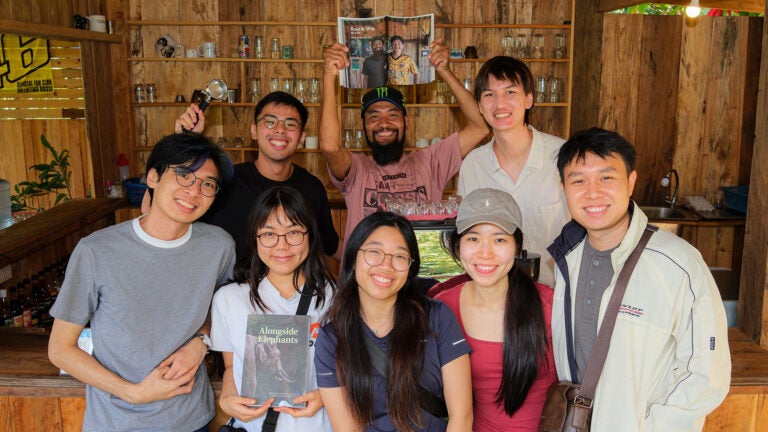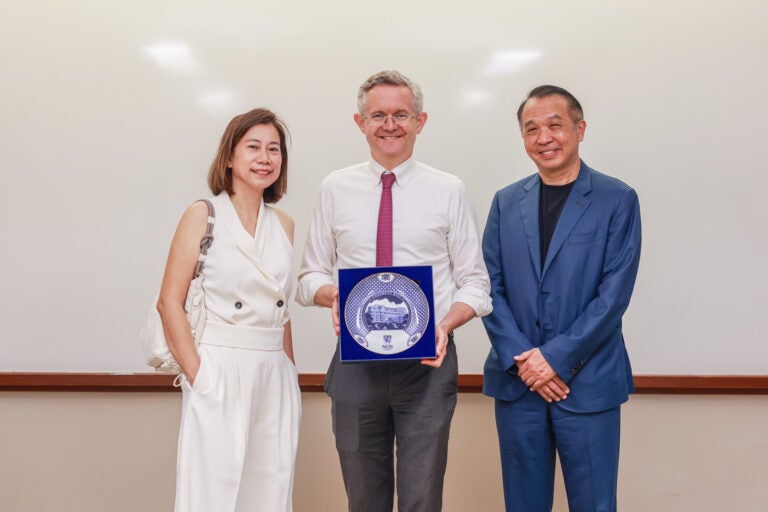
On behalf of The Cinnamon Conversations, Zheng Chengzhi (right) conducted an interview with Mr Kailash Satyarthi, filmed by fellow student Nguyen Thu Hoai (left). Hosted by NUS College on 14 September 2022, Mr Satyarthi delivered an uplifting lecture to students and guests as part of the Singapore Nobel Prize Dialogue.
Earlier in the day, I heard directly from a Nobel Peace Laureate alongside rows and rows of excited students. Mr Kailash Satyarthi is an internationally renowned children’s rights activist; he has dedicated his life to the eradication of child labour and the promotion of education for children, both in India and around the world. For his tireless efforts, he was jointly awarded the Nobel Peace Prize with Malala Yousafzai in 2014.
Following the lecture and lunch with the Laureate and a few invited guests, I sat down with Mr Satyarthi for our interview. I was conducting the interview as a member of The Cinnamon Conversations (TCC), a student group which organises cozy, informal dialogues with invited guests. During the interview, Mr Satyarthi spoke quietly and eloquently, with a bright clarity in his eyes. You can watch the full interview here:
Among his many insightful sharings, I’d like to expand on what felt personally salient. I was particularly curious to ask: where did his courage and conviction to conduct activism come from? After all, Mr Satyarthi has experienced great difficulties and setbacks in his career – facing coercion, persecution, and even violence to himself and his close ones. Yet he has unfailingly continued to fight on. Mr Satyarthi shared with me that each time he was attacked, he took it as a renewal of confidence in himself and his mission. He firmly believes that those who attack him come from a place of feeling threatened by his cause, exposing their true weakness. On the other hand, Mr Satyarthi has staunchly remained on the path of non-aggression, rallying the hearts and minds of millions to his cause. This was a powerful philosophy he had adopted from Mahatma Gandhi. Mr Satyarthi’s ability to transcend physical pain and loss in the pursuit of his cause was highly inspirational to me, as was his commitment to winning people over without force, aggression, or guns. That, truly, was the embodiment of strength.
Mr Satyarthi also shared his wisdom on the topic of managing personal stress. His advice: to return to our “inner child”, by acting with simplicity, honesty, and without fear of expression. “If I’m sad, I can cry,” he said. “If I cry – I’m not weak. Crying is much more courageous than hiding your inner emotions.” All too often, we seem to stigmatise negative feelings, teaching that pain and hurt should be internalised or suppressed. Mr. Satyarthi’s personal philosophy – of expressing emotions sincerely and without artificiality – therefore spoke deeply to me.
Mr Satyarthi had spoken powerfully during his lecture, too. Particularly memorable was his exhortation for us to become a force for good – to recognise our personal capacity and duty to uplift social causes, such as children’s rights. I found Mr Satyarthi’s words aligning with what I’d learnt from Sociology, where we routinely engage with concepts of social inequality and capitalistic exploitation. We learn about developing countries producing for the developed; the economically disenfranchised made to serve the interests of the economically well-off. Consonantly, Mr Satyarthi called on us to remember that everything we use and enjoy, be it the clothes on our backs or the chairs we were sitting on, was produced by someone else. And that even as we were reclining in our seats, over 160 million children were making shoes, digging tunnels, working in brothels, toiling their lives and dreams away for the more privileged. He reminded us that the vast majority of us are more fortunate than unfortunate; none of us have had to experience the harsh fate these children live through each day. Mr Satyarthi entreated us to think beyond our country and its comforts, to acknowledge a wider, human obligation – to “glow and enlighten the world” with the fire of compassion within each of us.
Later at lunch with invited guests, Mr Satyarthi continued to share his life experiences with us, including his teenage efforts to challenge caste discrimination, and the origins of his caste-defying last name, Satyarthi (meaning “seeker of truth”). He was joined by his team from the Nobel Office, and his wife and fellow colleague, Madam Sumedha Kailash – who smiled brilliantly as he recounted fond memories of the past.
After our interview concluded, it was finally time for Mr. Satyarthi and his team to go. But even as his tall presence departed campus, I could still hear his words ringing. They resound in the many ears that heard them that afternoon – and many more who will be hearing them soon.
“You exist in the world,” he’d said to us. “You exist in the world to make it better, to make it peaceful. Your degree, your knowledge, will help.”


